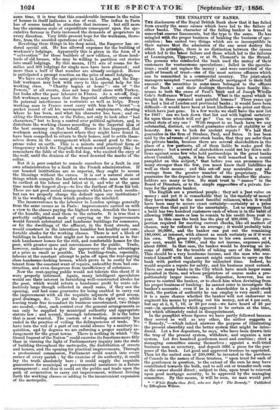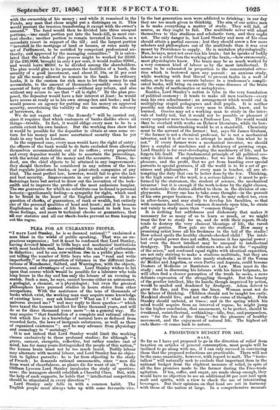THE IINSIFETY OF BANKS.
Tae disclosures of the Royal British Bank show that it has failed from exactly the same causes which have led to the failure of other banks. The character of the failing banker is traced in somewhat coarser lineaments, but the type is the same. He has mingled with the proper business of banking the business of spe- culation ; has united two things which are so incompatible in their nature that the admission of the one must destroy the other. In le, there is no distinction between the causes Which led to thpmi litest failure and those which led to the failures at Leamington, Tipperary, or at St. Clement's in the Strand. The persons who conducted the bank used the money of their customers for venturesome speculations.; failed in the specula- tions ; could not replace the money; and were convicted of the guilt of breach of trust—one of the most serious offences which can be committed in a commercial country. The joint-stock managers accepted " securities " already mortgaged to their full amount ; the securities in some eases belonged to the officers of the Bank : and their dealings therefore have family like- nesses to both the eases of Paul s bank and of Joseph Windle Cole's Sufferance Wharf warrants. What is the moral which' is taught in these repeated and painful lessons ? Three years ago we had a list of London and provincial banks ; it would have been difficult—it would have been at least libellous—to point out those which have just gone. In a few weeks we shall have the new list for 1857: can we look down that list and with logical certainty fix upon those which will not go ? Can we pronounce upon th actual state of any one ? With respect to no bank have we any substantial, distinct, or settled guarantee either of stability or of honesty. Are we to look for ancient repute ? We had that guarantee in the firm of Strahan, Paul, and Bates. It has been said by the advocate of joint-stook banks, that they are safer than the private berate, because there are several shareholders in the place of a few partners, all of them liable to make good the guarantee : but a crowd of shareholders could not lay down mil- lions against some few who hold partnerships in the peat banks about Cornhill. Again, it has been well remarked in a recent pamphlet on this subject,* that before you can .pronounce the many stronger than the few, ,.(:)u must know their liabilities as well as their means ; and this set-off may neutralize any ad-. vantage from the greater number of the proprietary. The guarantee for the depositor is about the same whether the share- holders are many or few. He must trust to " names " in the Board of Directors, or to the simple supposition of a private for- tune for the private banker. The English are a practical people ; they set a just value on money ; and yet it is remarkable that in the custody of money they have trusted to the most fanciful reliances, when it would have been easy to secure exact certainty—certainty at a price cheaper than thirt paid for the uncertainty. Let us suppose that a bank has two hundred customers each of whom is in the habit of allowing 10001. more or less to remain to his credit from year to year. In this case the bank has the play of 200,0001. The pro- portion required for meeting current checks, like all matters of chance, may be reduced to an average ; it would probably take about 20,0001., and the banker can put out the remaining 180,0001. at interest, with almost as much certainty as if it were his own. The gross yearly income to his own account, at 4 per cent, would be 72001., and the net income, expenses paid, about 52001. In that case, the banker would be drawing an in- come of 52001. for the trouble of taking care of the 200,0001. This should be a very handsome income, and the man who con- tented himself with that amount might continue to carry on the bank with perfect regularity for unlimited time. Indeed, he would acquire a repute for safety, and his business must extend. There are many banks in the City which have much larger sums deposited in them, and whose proprietors of course make a pro- portionately larger income. The depositor, however, has no power to control the banker, or to check him when deviating from his proper business of banking : he cannot enter to investigate the banker's accounts ; even if he is a shareholder in a joint-stook bank, the portion of authority he can employ is very small; and it is a mere chance whether the banker will not endeavour to augment his means by putting out his money, not at 4 percent, but say at 5, 6, 7, 10, or 20 per cent—we have heard of 25 per cent—an speculations which appeared to be certain at the time, but which ultimately- ended in disappointment. In the pamphlet whose figures we have partly followed because they .served as well as any other, the author suggests a " Remedy,"—which indeed answers the purpose of illustrating the present absurdity and the better system that might be intro- duced. Let a few depositors, he says, who have been drawn into the trap of the present system, withdraw, and organize a new system. Let five hundred gentlemen meet and combine ; elect a managing committee among themselves • appoint a well-tried business man as secretary, and deposit 5001. a piece for the pur- poses oT the bank. Let good and approved trustees be appointed. Then let the united sum of 250,0001. be invested in the purchase of Consols in the names of these trustees, " upon trust for each of the gentlemen in question, to the extent of the sum he.may have contributed towards the bulk, and to sell out or transfer such sum as the owner should direct ; subject to this, upon trust to reinvest upon good mortgage security, to be approved by the managing committee. By this means, it will be seen, no man would part * " While Banks them Fail, who are Safe? The Remedy." Published by Effingham Wilson. with the ownership of his money ; and while it remained in the Funds, any man that chose might put a distringas on it. This would prevent the trustees transferring it except with the owner's consent." The fund would then be divided into three unequal portions,---one small portion put into the bank-till, to meet cur- rent checks ; another portion to remain invested in. Consols, as a secondary, resort in support of the till ; and the largest portion "invested in the mortgage of land or houses, or rates made by act of Parliament, to be certified by competent professional au- thority, and approved by the managing. committee." It is calcu- lated that the whole of this process might be worked for 22501. If the 230;0001, brought in only 4 per cent, it would realize 92001., and would leave 8950/. to be divided among the shareholders. The plan would give to its promoters the facilities of a bank, the security of a good investment, and about 21. 10s. or 31. per cent for all the money allowed to remain in the bank. In ordinary banks, it is the custom for rich men to let their money he and accumulate, to the amount of thousands—possibly even to the amount of forty or fifty thousand—without any return, and also -without any access to see that " all is right." By the plan pro- posed, the depositor would have a fair interest at least: he would have access as ready as to his own strong-box and books ; and he would possess an agency for putting out his money on approved security, ascertaining the validity of the securities, the solvency of borrowers, ctc. We do not expect that " the Remedy " will be carried out, since it requires that which customers of banks dislike above all things—trouble. In fact, it would oblige every man to be to a certain extent his own banker. But the working does show that it would be possible for the depositor to obtain at once some re- turn for his money and more ascertained security than he yet finds in any bank in London. In the supposed case, every man would have the right of entry ; the officers of the bank would be de facto excluded from allowing themselves accommodation out of its coffers ; every proprietor and every depositor would be able to ascertain the proceedings, with the actual state of the money and the accounts. These, in- deed, are the chief objects to be attained in any improvement ; they should therefore be considered in any reform of the laws that regulate joint-stock banks, or joint-stock companies of any kind. The most perfect law, however, would fail to give the last and best security. Improvements in our police or our window- fastenings have but served to draw out the invention, of the lock- smith and to improve the profits of the most audacious burglar. The one guarantee for which no substitute can befound is personal honesty--gentlemanly feeling—a sympathy foi right, which used to be found in the- heart of the English gentleman. It is- no question of checks, of guarantees, of rank or wealth, but entirely one of the personal qualities of head and heart ; and it is because Englishmen in all matters of life have learned to look less to those feelings, and more to technical checks or guarantees, that all our statutes and all our check-books prevent us from keeping out the rogue.



























 Previous page
Previous page